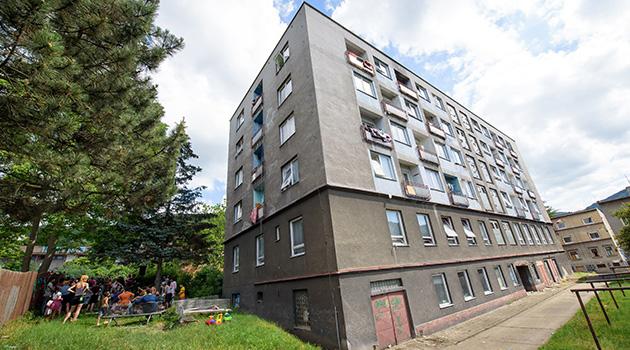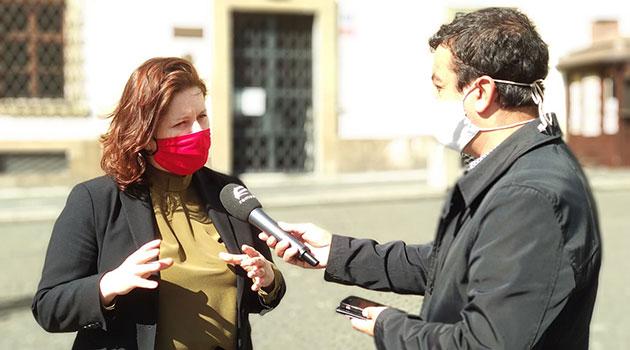Czech mayors regret abolition of housing benefit-free zones, one alleges the move will "cause extremism"

Elected representatives of local authorities regret the fact that the Czech Constitutional Court has abolished part of the law on aid to those in material distress that facilitated the establishment of “housing benefit-free zones” and say they consider such zones to be one of just a few opportunities for preventing influxes of what they term “problematic” people onto their territories. Some mayors believe there will now be enormous pressure placed on the Chamber of Deputies to draft a similar law that will not contravene the Constitutional Court finding, according to the Czech News Agency (ČTK).
Deputy Mayor of Liberec Ivan Langr (Mayors for the Liberec Region), who is responsible for social affairs there, said he believes communities are now losing the only repressive tool they had to solve the situation in areas with “problematic” housing. “It was an extreme solution, although it had its drawbacks – for example, it just applied to new tenants, not existing ones,” he told ČTK.
In Liberec, which has a population of 100 000, just one housing benefit-free zone has been declared for three privately-owned buildings in the Františkov neighborhood, on Vojanova Street. “I personally believe abolishing benefit-free zones does not currently affect us much,” the deputy mayor said.
“We do have problems in areas other than Vojanova, but I am almost completely certain that those areas never fulfilled the terms for establishing a benefit-free zone even if that passage in the law had not been abolished,” Langr added. Improving the situtation on Vojanova Street, in his view, has rather been assisted by the fact that the “worst” building there had been in such poor repair that the building authority decided to condemn it.
Those living in that building had to relocate elsewhere, which had always been the desired result. In the town of Přerov, roughly 10 streets and Masarykovo náměstí have been put on a list of what are termed “areas with an increased incidence of socially undesirable phenomena”, the prerequisite for declaring a benefit-free zone.
The town had been planning to expand such zones in the near future to include the building at Žerotínovo náměstí 22, which is in the neighborhood of the Labor Office. “In Přerov we took advantage of that measure in localities where there was an objective problem with groups of inadaptable residents [EDITOR’S NOTE: The term “inadaptable” in Czech comes from the German term “unanpassungsfähig“, used by the Nazis to designate the “inconvenient” groups whom they then sent to the extermination camps] – sometimes this just had to do with specific buildings,” the Mayor of Přerov Petr Měřínský (ANO) told ČTK.
“Because of this [the Constitutional Court decision] we have, of course, lost one of the few instruments for preventing an influx of problematic people,” the mayor said. In the town of Znojmo, local leadership had been planning to declare its historical center a benefit-free zone.
According to Mayor Jakub Malačka (for the Czech Social Democratic Party – ČSSD) the instrument would have prevented those who speculate in rental housing from moving residents into the center of town who move in circles on the fringes of society and who frequently commit misdemeanors in their new places of residence. “I’ve visited several towns all over the republic and they all told me that while zones are not a cure-all, they are one of the few things that function in the legislation and that they would introduce them all over again,” the mayor told ČTK.
“Today’s decision is a disappointment to me,” Malačka said. He went on to add that while such zones are not the only instrument available, they are apparently the most effective one.
According to the Mayor of Sokolov, Renata Oulehlová (ANO), the abolition of housing benefit-free zones does not just cause damage to the residents who live near localities with rental units owned by “traffickers in poverty”, but it also harms the socially vulnerable who are doing their best to resolve their situations. Sokolov was the first town to institute the zones and, according to the mayor, their experience with them has been a good one.
Currently she is concerned the social situation in the town will deteriorate further now that they are banned. The town of Česká Lípa had just announced a benefit-free zone in the center of town to begin today.
Municipal staffers there are currently trying to figure out how the Constitutional Court decision affects their new decree. “We have to carefully study the Constitutional Court finding, and naturally we will adapt the measure to conform to the finding or abolish it if necessary,” Mayor Jitka Volfová (ANO) said.
“Of course we will continue to address a resolution for the situation in the center of town,” she said. In the town of Úpice, Mayor Petr Hron (“Live in Úpice”) said he believes abolishing the benefit-free zones is a big mistake.
“The state is turning normal citizens who are decent and hardworking into racists and extremists. Through this decision, the state is creating the conditions for extremism and racism,” he alleged to ČTK.
“I will house the Constitutional Court justices here for a week so they can see for themselves,” Hron said. The Mayor of Orlová in the Karviná district, Miroslav Chlubna, said he believes the decision will just complicate the situation for local authorities.
In his view, the problem the zones were meant to address will not disappear, but will just be kicked down the road again. Mayor of Třebíč Pavel Pacal (“For Třebíč”) told ČTK that “We wanted to eliminate the families who are migrating all over the Czech Republic, they go where there are vacancies and where they can get housing benefits at that address.”
Třebíč had wanted to introduce a benefit-free zone this November for selected streets where there are a higher degree of misdemeanors being committed, mainly at night. The move would have meant that those otherwise eligible for housing benefit would no longer have been able to receive it at those addresses.
“[A benefit-free zone] was one of just a few ways to partially eliminate this. The biggest source of our problems, from the standpoint of behavior and misdemeanors, is exactly the group of residents who draw housing benefits,” the mayor said.
“In Třebíč, this problem appeared during the last half-year because Romani families from Brno and from Slovakia began migrating here,” the mayor alleged. He said the town will have to confer on what to do next after obtaining a legal analysis of the court decision.
According to the rapporteur for the Constitutional Court, Justice Jiří Zemánek, municipalities must now abolish their instituted measures for benefit-free zones, otherwise they will violate the court’s finding. The rapporteur also said those who had previously been denied housing benefits because of such zones would not be eligible to now have the amounts disbursed to which they would otherwise have been entitled.
